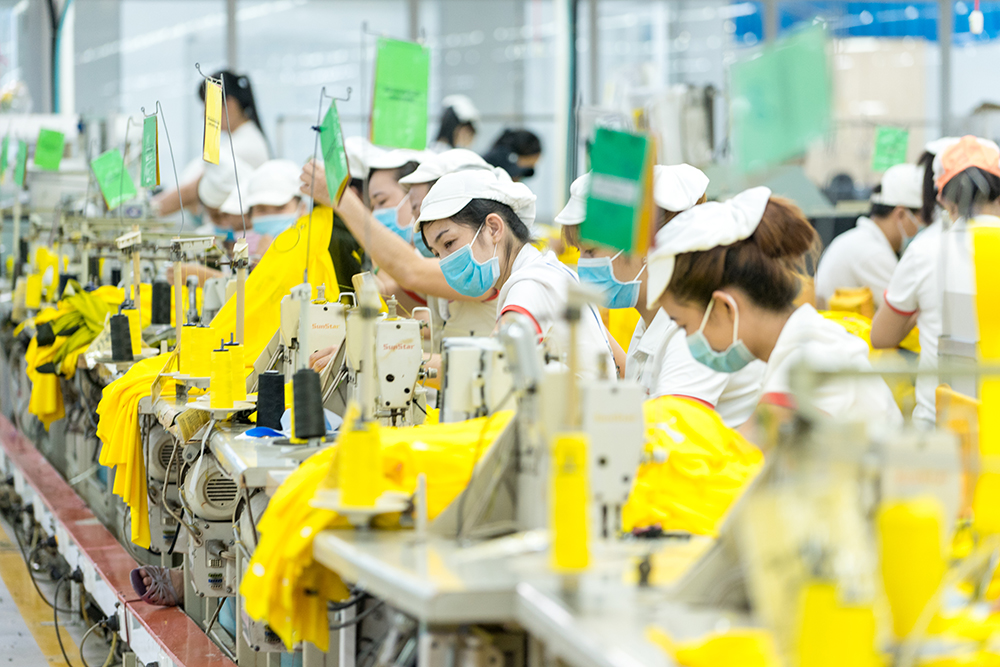Target Description:
Embed Human Rights across our operations and suppliers. Positively impact the communities where PUMA is present.
Relates to United Sustainable Development Goals 3,4,5,10
Examples from the 10FOR20 Action Plan:
KPIs:
PUMA’s sustainability policies are aligned with the UN Declaration of Human rights, the International Labor Organization’s Core Labor conventions and the ten principles of the United Nations Global Compact.
The observance of human rights has been a part of our first Code of Conduct in 1993 and has guided our business ethics since then. In 2019 we established a Responsible Purchasing Policy and a respective training program to ensure our sourcing practices are aligned with our Code of Conduct.
In previous years, we conducted human rights risk assessments at corporate and supply chain respectively and communicated the results in our 2016 and 2017 Annual Reports. The most critical risks to human rights are forced/bonded labor in our supply chain and, at the farm level, also the risk of child labor.
To mitigate the risk of forced and bonded labor we have advised our suppliers to eliminate any recruitment fees. Such fees were previously paid by migrant workers to labor contractors for bringing them to apparel factories in Mauritius and Malaysia. We also updated our Forever Better Handbook on Social Standards accordingly and, together with other brands, succeeded in eliminating recruitment fees from our suppliers in Mauritius. In Malaysia we had only one active supplier, with whom we no longer work, so that there are no recruitment fees at our Tier 1 suppliers. There are still some challenges in the second tier of our supply chain (fabric manufacturing in Taiwan), which we are currently working on. We hope to resolve this issue by the end of 2020.
To ensure human rights are observed in cotton farming, we have joined the Better Cotton Initiative in 2015. We have since scaled up our use of BCI Cotton from zero to 80% currently. At the end of 2020 we aim increase that figure to 90% and at the latest by 2025, our target is to purchase 100% of our cotton from certified, more sustainable sources (BCI and organic cotton, recycled cotton).
Additionally, we have identified community engagement as an important vehicle to create a positive impact locally, including on social and human rights causes.
Therefore, we have a community engagement program in place at PUMA. In 2019, our PUMA colleagues around the globe spent 21,433 hours in community engagement work. For more details on our community engagement program and HR programs please refer to the One Team Performance section of this report.
Target Description:
Compliance with industry standards / ILO Core Conventions for all core suppliers, including suppliers of finished goods as well as component and material suppliers.
Relates to United Nations Sustainable Development Goals 3,5,8,10
Examples from the 10FOR20 Action Plan:
KPIs:
Our social compliance program dates back to 1999 and was accredited by the Fair Labor Association in 2019 for the third time. In 2019, we continued our partnerships with the Fair Labor Association, the Better Work Program of the International Labor Organization and International Finance Corporation and the Social and Labor Convergence Program (SLCP), supporting the roll out of SLCP 2019 operations in China. A total of 43 PUMA China and Taiwan core T1 and T2 suppliers completed SLCP assessments.
Duplicate audits by numerous brands can create an administrative burden on a single vendor and be an inefficient use of resources. That is why we heightened our collaborative efforts in this area to increase the percentage of shared audits with other companies from 39% to 43% of PUMA suppliers. This is how we aim to reduce costs and resources and maximize the efficiency of how we monitor our collective supply chain as an industry.
In total, we conducted 475 audits in 418 factories with 94% of our Tier 1 vendors earning a passing grade. Six percent of T1 suppliers failed to meet our requirements. If this happened to an active PUMA supplier, we worked with these partners to improve the situation. 62% of those receiving a second audit received passing grades. Nine factories could not sufficiently improve their performance and were consequently removed from our active supplier factory base. Those that applied to be suppliers but failed their first audits were not admitted.
We employ a team of compliance experts spread across all major sourcing regions. They regularly visit and audit our core manufacturing partners. We also employ external compliance auditors and work with the Better Work Program of the International Labor Organization. Each PUMA supplier factory has to undergo a mandatory compliance audit on an annual basis and any issues identified need to be remedied as part of a corrective action plan.
| Factory audits | 2019 | 2018 | 2017 | ||||
|---|---|---|---|---|---|---|---|
| T1 | T2 | Warehouses | T1 | T2 | T1 | T2 | |
| A (Pass) | 107 | 10 | 0 | 82 | 15 | 87 | 13 |
| B+ (Pass) | 126 | 17 | 1 | 148 | 29 | 122 | 27 |
| B- (Pass) | 121 | 10 | 0 | 128 | 42 | 118 | 34 |
| C (Fail) | 19 | 2 | 1 | 17 | 7 | 18 | 3 |
| D (Fail) | 4 | 0 | 0 | 5 | 0 | 9 | 1 |
| Total | 377 | 39 | 2 | 380 | 93 | 354 | 78 |
| 418 | 473 | 432 | |||||
| Pass/Fail % | 94/6 | 95/5 | 50/50 | 94/6 | 91/9 | 92/8 | 95/5 |
Beyond auditing, we track social key performance indicators such as average payments vs. minimum wage payments, overtime hours or coverage by collective bargaining agreements.
Table 3 confirms that a majority of our core suppliers pay basic wages clearly above the minimum wage, on average 17.6%. Adding overtime and bonus payments, this figure increases to 73.1%, a slight reduction from previous years which can be attributed to increases in minimum wage figures. Social insurance coverage remains above 90% and the percentage of permanent workers is getting close to 70%.
| 2019 | LATIN AMERICA | SOUTH ASIA | EAST AND SOUTHEAST ASIA | EMEA | 2019 | 2018 | 2017 | ||||||
|---|---|---|---|---|---|---|---|---|---|---|---|---|---|
| KPI | Mexico | Bangladesh | India | Pakistan | China | Cambodia | Indonesia | Philippines | Vietnam | Turkey | Average | Average | Average |
| Gross wage paid above minimum wage excluding overtime and bonuses (%) | 59.1 | 22.9 | 18.5 | 22.1 | 7.6 | 8.6 | 1.6 | 0.0 | 33.6 | 2.4 | 17.6 | 20.9 | 26.1 |
| Gross wage paid above minimum wage including overtime and bonuses (%) | 158.3 | 70.5 | 28.7 | 31.0 | 170.2 | 66.8 | 39.7 | 35.1 | 108.1 | 22.4 | 73.1 | 83.7 | 86.7 |
| Workers covered by social insurance (%) | 86.0 | 100.0 | 97.7 | 99.0 | 64.3 | 100.0 | 100.0 | 95.5 | 93.9 | 100.0 | 93.6 | 95.3 | 95.7 |
| Overtime work (hours per week) | 2.5 | 10.2 | 0.0 | 0.2 | 18.9 | 7.8 | 7.0 | 10.3 | 8.7 | 5.2 | 7.1 | 6.1 | 6.8 |
| Workers covered by a collective bargaining agreement (%) | 0.0 | 0.0 | 0.0 | 0.0 | 94.4 | 28.2 | 33.3 | 0.0 | 98.4 | 0.0 | 25.4 | 26.7 | 21.5 |
| Female workers (%) | 49.8 | 42.7 | 47.3 | 8.9 | 64.0 | 84.3 | 88.8 | 69.0 | 80.4 | 59.0 | 59.4 | 56.0 | 59.3 |
| Permanent workers (%) | 14.6 | 100.0 | 100.0 | 100.0 | 25.5 | 30.9 | 97.9 | 68.5 | 53.3 | 100.0 | 69.1 | 68.0 | 63.6 |
| Annual Turnover Rate (%) | 61.0 | 33.4 | 6.6 | 20.8 | 63.0 | 43.3 | 17.2 | 64.8 | 40.0 | 32.2 | 38.2 | 36.8 | 40.3 |
| Injury Rate (%) | 0.2 | 0.3 | 0.0 | 0.0 | 0.5 | 0.5 | 0.2 | 2.7 | 0.3 | 0.3 | 0.5 | 0.6 | 0.4 |
| No. of suppliers | 59 | 50 | 59 | * Data received from 59 PUMA core suppliers representing 82% of 2019 production volume; reporting period for data collection: November 2018 – October 2019 | |||||||||
We operate a PUMA worker compliance hotline. Phone numbers and email addresses of this hotline are visible on our Code of Conduct posters, which are displayed at every PUMA supplier globally. We also use social media such as WeChat to connect with workers and have established more formalized compliance and HR apps at selected core suppliers.
In total, 61 complaint issues across 7 countries were raised to PUMA’s feedback system, 39% more than in the previous year. 100% were resolved by our team. In India we broke through the zero-complaints threshold, with one worker reaching out to PUMA about a compensation issue.
We also received 11 third-party complaints from external organizations related to PUMA manufacturing partners. The third-party complaints focused on freedom of association, fair compensation and discrimination. All 11 third-party complaints were resolved by year end.
| Worker Complaints | 2019 | 2018 | 2017 |
|---|---|---|---|
| Total received | 70 | 55 | 81 |
| Total confirmed | 61 | 44 | 74 |
| Resolved | 61 | 44 | 70 |
| Not resolved | 0 | 0 | 4 |
| Resolution Rate (in %) | 100 | 100 | 95 |
Any issues identified during our auditing and hotline activities are classified into zero tolerance issues (such as child labor or forced labor) critical issues and other issues.
As the name implies, zero tolerance issues lead to the immediate failure of an audit. In case of a new factory, this factory will not be allowed to produce PUMA goods. For an existing factory, zero tolerance issues must be remedied immediately. This includes a root-cause analysis and preventive action must be taken to avoid the issue from reoccurring in the future. As a last resort, business relationships will be terminated if the factory is not cooperating. Other issues are also followed up by our compliance team.
During 2019 we identified 3 zero tolerance issues and were able to remedy all of them.
| Country | 2019 | 2018 | 2017 | Grand Total |
|---|---|---|---|---|
| Cambodia | 1 | 1 | ||
| China | 1 | 1 | 2 | |
| Indonesia | 1 | 1 | 1 | 3 |
| Vietnam | 1 | 2 | 2 | 5 |
| Grand Total | 3 | 5 | 3 | 11 |
Moving from auditing to remediation and capacity building in our supply chain, we have set up capability-building initiatives to make suppliers more resilient and self-sufficient. To improve HR management skills and educate HR managerial team members, human resource management workshops were launched at 10 PUMA footwear suppliers in China.


In 2018 and 2019, PUMA moved to an operational phase on wage issues. With the support of the Fair Wage Network, it carried out a series of fair wage assessments at its core suppliers in Bangladesh and Cambodia. Some of them were certified by the Fair Wage scheme, based on their performance across 12 fair wage dimensions. A number of its other suppliers operating in those two countries will implement a remediation phase to improve their pay practices.
PUMA’s aim for 2025 is to expand this assessment and remediation exercise to suppliers from other countries. This should lead to fairer and also more efficient pay practices.Daniel Vaughan-Whitehead
Fair Wage Network
Co-Founder and Chair